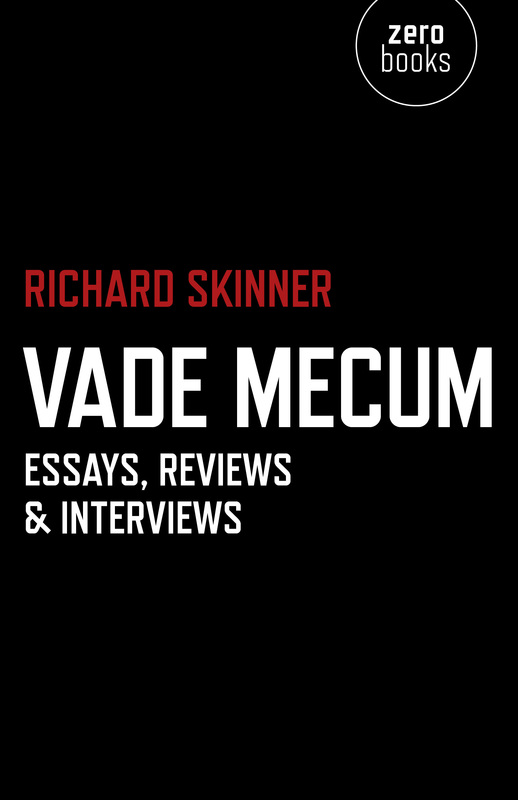'Vade Mecum: Essays, Reviews & Interviews' (Zer0 Books, 2015)
|
Vade Mecum brings together Richard Skinner’s best essays, reviews and interviews from 1992-2014. There are close critical engagements with writers (Kazuo Ishiguro, Italo Calvino, Shakespeare’s The Tempest) and composers (Erik Satie, Iannis Xenakis, Luc Ferrari), meditations on films and filmmakers (Antonioni, Krzysztof Kieślowski, Chinatown) and idiosyncratic reflections on Werner Herzog’s Of Walking in Ice and Steely Dan.
‘This is the most exciting & intelligent collection of essays I've discovered this year. The combination of being exquisitely intellectual, classic & also contemporary is rare.’ Nuzhat Bukhari, author of Brilliant Corners ‘A gorgeous collection of reviews and essays about music, writing and film, from a Bookie regular. Each chapter is the perfect length for a coffee and a think.’ Margate Bookie 'Writing in such a straightforward, comprehensible manner... this book, above all, contains some of the most incredible definitions of dub that I have ever read.' ✭✭✭✭✭ Gianluigi Maino, journalist 'I have to say that Skinner's dub essay is amazing. I think it's one of the best pieces of music writing I've read, period.' Owen Vince, author of Ben Affleck: An Unofficial Biography 'Loving Richard Skinner's Vade Mecum—a fantastic set of funny, insightful and thought-provoking essays about most of my favourite things.' Stav Sherez, author of Eleven Days, A Dark Redemption (both Faber & Faber) 'a slim but dense source ... of promising trails to follow, and well worth keeping close to hand for that reason alone.' Craig Nicholson (read the full review here) 'This compilation brings together a selection of about 30 essays, reviews and interviews originally published between 1992 and 2014. Although his subjects are often familiar, Richard Skinner tackles them from unusual and refreshing angles, navigating with ease between Kazuo Ishiguro’s use of unreliable narrators and the psychological dimension of Shakespeare’s The Tempest (1610–11), the ‘eerie angst’ of Michelangelo Antonioni’s films and Krzysztof Kieślowski’s metaphysical cinema – to name just a few. A novelist, poet and director of the fiction programme at the Faber Academy in London, Skinner is also a film and music critic, writing reviews and features for the likes of The Guardian and the Financial Times, as well as numerous essays for Faber’s blog and other platforms. His most compelling (and most substantial) piece though is probably his essay ‘Dub: Red Hot vs Ice Cold’ (2013), which charts the evolution of dub music from the warm beats of Jamaica to the colder rhythms of Europe and North America, with Skinner striving along the way to elevate dub from subgenre to a complex artform. The passionate prose is invigorating (‘Dub is a virus. It infects the body and warps the mind,’ he writes) and symptomatic of Skinner’s own incubation in the music while growing up in Trinidad during the 1960s and in the UK from the late 1970s. Skinner’s texts are seasoned with personal anecdotes, from his encounter with Kieślowski in the dining room of a Brighton B&B, to how, while working at London’s Gatwick Airport as a teenager, he came across Werner Herzog’s diary Of Walking in Ice (1978) and a stash of heroin ‘the size of a bag of sugar’. But just when you think you’ve figured out the author’s formula, along comes a whimsical essay like ‘Flickers’, in which a succession of fragments from cinema’s classics unfold before your eyes via a loose process of word- and thought-association: ‘Robert Duvall preparing himself to be executed in The Eagle Has Landed. Birds in Psycho. The bird in the cage in Jean Pierre Melville’s Le Samouraï. Alain Delon as the most handsome man in cinema.’' Louise Darblay ArtReview Keywords: Literary criticism, film theory, comparative essay, creative journalism, life writing. You can buy a copy from Zero here Or from Amazon here |

